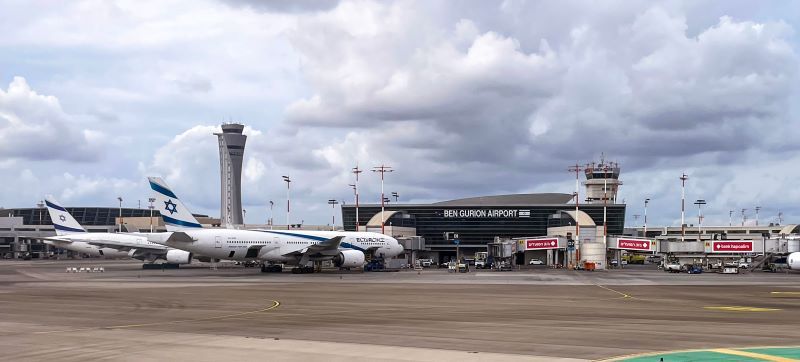
Israel’s Ben Gurion Airport in Tel Aviv has canceled all
flights until further notice following Israel’s airstrikes on Iran, according
to the airport. Iran has closed its airspace. Jordan, Iraq and Syria have reopened airspaces to passenger operations after temporary closures.
Delta Air Lines and United Airlines operate flights to Tel
Aviv, and each of those routes have been suspended. American Airlines had not
yet resumed flights between the U.S. and Tel Aviv.
United arranged seats on El Al out of Tel Aviv for 26
crewmembers who were on layover. United’s Flight 84 from Newark Liberty International Airport
to Tel Aviv returned to Newark. Flight 90 on Thursday from Newark to Tel Aviv
had been canceled. Flight 91 had departed Tel Aviv for Newark when the closure
began, and the plane continued to Newark.
A company spokesperson emailed BTN on Saturday that EWR-TLV
flights are suspended through July 31. “We will continue to evaluate future
flights for the safety of our crew and customers,” they wrote.
Delta has paused its flights between New York’s John F.
Kennedy International Airport and Tel Aviv through Aug. 31, and has issued a travel waiver for customers affected during
that time.
“The safety of our customers and crew remains our top
priority,” Delta said in a statement. The carrier is “continuously
monitoring the evolving security environment and assessing our operations based
on security guidance and intelligence reports.”
Middle Eastern and European Carriers
El
Al said it has further canceled flights through next Monday June 23
to the following destinations: Berlin, Tbilisi, Barcelona, Batumi,
Warsaw, Rhodes, Munich, Tivat, Lisbon, Tokyo, Krakow, Venice,
Thessaloniki, Marseille, Crete (Heraklion), Kefalonia, Santorini,
Chisinau, Belgrade, Tirana, Porto, Mykonos Lefkada and Moscow.
Lufthansa
has canceled all services to Tel Aviv and Tehran up to and including July
31, with flights to Amman, Erbil and Beirut currently suspended
through 20 June.
Meanwhile, Air France has suspended
its Tel Aviv flights “until further notice” and the carrier is “closely
monitoring the situation in the Middle East in real time”.
Other major European carriers, including British Airways, easyJet and Ryanair are not currently flying to Israel.
Middle
Eastern airlines, including Emirates, Etihad and Qatar Airways, have
suspended services to some countries in the region as well as rerouting
some flights.
Dubai-based Emirates has suspended flights to Amman,
Beirut, Tehran and the Iraqi cities of Baghdad and Basra until June 30,
while services to Jordan and Lebanon have been cancelled until June 22.
Flights to Tel Aviv are also suspended.
Etihad Airways has
canceled all flights from Abu Dhabi to Tel Aviv until June 22, and
Qatar Airways has “temporarily canceled flights to Iran, Iraq and Syria
due to the current situation in the region”.
The
crisis has also led to United Airlines pausing flights to Tel Aviv up to
and including July31, while Delta’s flights from New York’s JFK
airport to Tel Aviv are suspended until Aug. 31.
Governments Evacuate and Warn
The crisis began June 13 when Israeli fighter jets attacked more than a dozen sites throughout Iran, including in Tehran. Israel, which said its intention was to damage Iran’s ability to develop nuclear weapons, attacked nuclear, military and government sites throughout the country. Iran retaliated the same day, launching missiles that struck at sites throughout Israel, including Tel Aviv. Attacks from both countries have continued since, with casualties in the hundreds.
Prior to Israel’s strikes on Iran, the U.S. State Department
pulled some personnel out of the Middle East, according
to Reuters.
On Wednesday, the State Department updated its travel
advisory for Iraq: “On June 11, the Department of State ordered the
departure of non-emergency U.S. government personnel due to heightened regional
tensions.”
Per the U.S. embassy in Israel’s website, the department on
Thursday restricted U.S. government employees and their family members from
travel outside the greater Tel Aviv, Jerusalem and Be’er Sheva regions until
further notice.
The State Department also had authorized voluntary
departures from Bahrain and Kuwait, according to Reuters.
The UK’s Foreign, Commonwealth and Development Office also issued a warning against all travel to Israel due to the conflict. “We
recognise this is a fast-moving situation that poses significant
risks,” said the FCDO in its travel advisory. “The situation has the
potential to deteriorate further, quickly and without warning. The
current situation has disrupted air links out of the country and may
disrupt road links.”
Other European countries including France and Germany have also issued similar warnings about travel to Israel and Iran.
________________________________________________________
This story was updated June 16 with additional information about U.S., European and Middle Eastern airline flight suspensions and airspace closures.